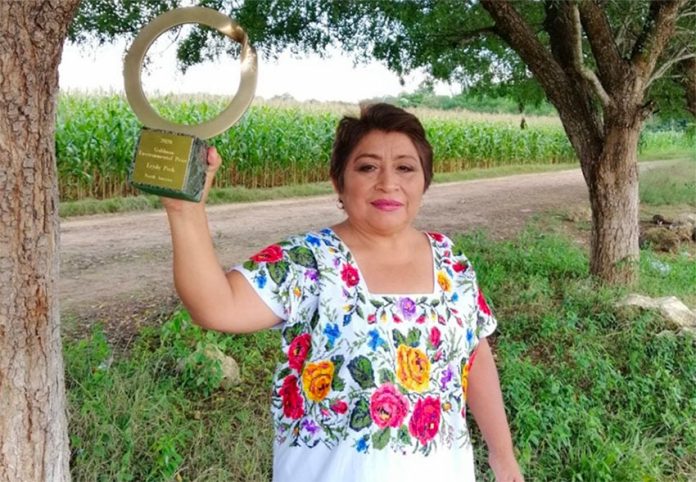Activist Leydy Pech, leader of a coalition opposed to the use of genetically modified seeds, has been recognized for her work in stopping the agrochemical company Monsanto from growing genetically modified soybeans in seven states.
The head of Sin Transgénicos (Without Transgenics) has been awarded the Goldman Environmental Prize for North America.
A beekeeper by trade, a Mayan by identity, Pech, 55, united farmers, beekeepers and nongovernmental organizations in a fight to get the government to revoke permits granted to the company in southern Mexico, saying its seeds were contaminating crops and the nation’s honey supplies with genetically modified material.
Mexico is the sixth-highest producer of honey worldwide.
The Goldman Prize, awarded by the Goldman Environmental Foundation, annually recognizes environmentalists from each of the world’s six inhabited continents, honoring environmental activism and leadership. Pech and this year’s other winners were honored on Monday in a virtual ceremony hosted by actress Sigourney Weaver.
“Even in the face of the unending onslaught and destruction upon our natural world, there are countless individuals and communities fighting every day to protect our planet. These are six of those environmental heroes, and they deserve the honor and recognition the prize offers them — for taking a stand, risking their lives and livelihoods, and inspiring us with real, lasting environmental progress,” said foundation president John Goldman.
Pech founded Sin Transgénicos after Monsanto began planting Roundup Ready GMO soybeans in her home state of Campeche. Mexico had given Monsanto permits to grow the GMO beans in Campeche, Yucatán — which produces 40% of Mexico’s honey — and five other states without consulting local communities, an omission that Sin Transgénicos successfully argued before the Supreme Court, claiming it violated the Constitution and Mexico’s obligations with the United Nations International Labour Organization.
In 2015 the court ruled in their favor. Two years later, in 2017, the government revoked Monsanto’s permits to grow the crops in all seven states.
Roundup Ready crops are controversial because they are genetically modified to withstand spraying with Roundup, a herbicide developed by Monsanto that contains glyphosate, identified as a probable carcinogen that has been linked to birth defects and miscarriages. The crops have also been shown to contaminate seeds of crops planted nearby with their genetic material.
Source: El Economista (sp)
